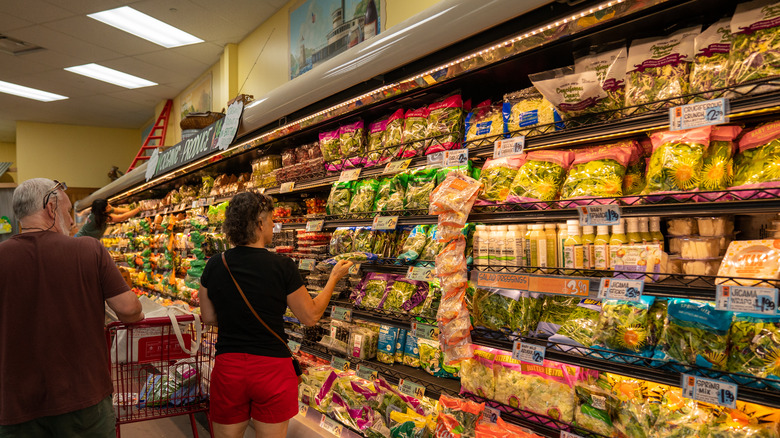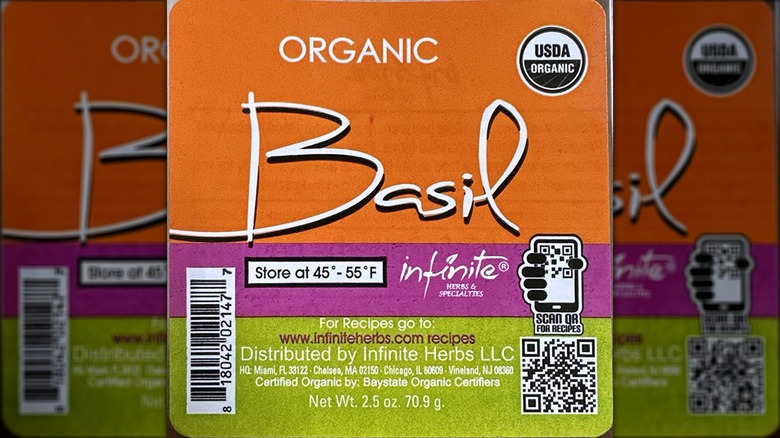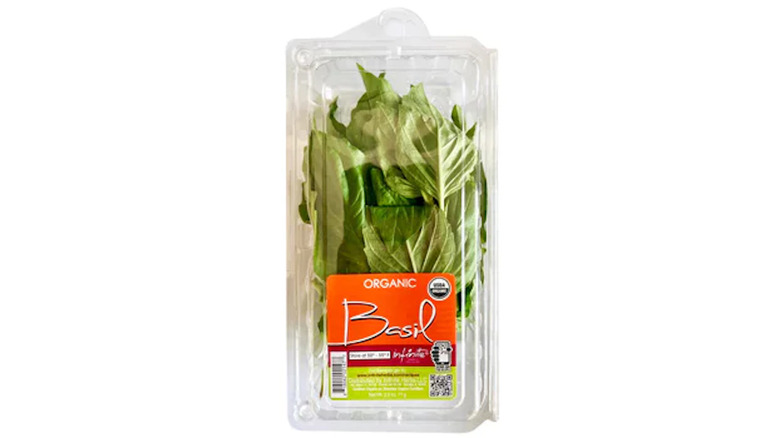Trader Joe's Recalls Organic Basil For Salmonella — Here's What To Know
Trader Joe's has recently issued a voluntary recall on its sale of Infinite Herbs Organic Basil because of a foodborne illness outbreak. The FDA defines a foodborne illness outbreak as: "When two or more people become sick from the same contaminated food or drink." So far, there have been 12 cases of illness potentially related to the contaminated basil and one hospitalization in seven states in the U.S., with the last reported illness occurring April 2. The product of concern comes in 2.5-ounce clamshell containers and was distributed to Trader Joe's stores in 29 states.
While the grocer has removed the possibly tainted basil from their shelves, TJ's is asking that customers check any recent purchases to see if they have a package of basil with the following UPC: 8-18042-02147-7. Anyone with a container of the potentially contaminated product — sold between February 1, 2024, and April 6, 2024 — is asked to discard it or bring it to a Trader Joe's location for a full refund. Customers with questions are encouraged to call Trader Joe's Customer Relations at (626) 599-3817 or email them. Infinite Herbs, the brand that distributed the basil to Trader Joe's, is cooperating with the FDA's ongoing investigation into the issue.
How dangerous is the tainted basil?
Salmonella can contaminate food anytime during production and processing, from harvesting in the fields to packagers handling the product. Most people recover from salmonella poisoning without treatment within four to seven days. However, severe cases can require hospitalization. The CDC recommends that anyone experiencing severe symptoms should contact a healthcare provider. These symptoms include diarrhea with a fever above 102 degrees Fahrenheit, excessive vomiting, or signs of dehydration, like feeling dizzy when standing up. Children under 5 years old, people over 65, or anyone with a weakened immune system should be cautious, as salmonella can be extra concerning for folks fitting these demographics.
People need to check the UPC on any organic basil they may have purchased because foods contaminated with salmonella don't usually smell, look, or taste any different than they normally do. The packages containing the potentially hazardous herb have likely expired by now. However, it's a good idea to double-check the fridge and freezer to ensure no tainted basil is lying around.
What other products are affected
As of now, there is no indication any other basil sources have been contaminated. The FDA's investigation into the issue is currently ongoing in states where the product was distributed by Trader Joe's locations, including AL, CT, DE, FL, GA, IL, IN, IA, KS, KY, ME, MD, MA, MI, MN, MO, NE, NH, NJ, NY, NC, OH, PA, RI, SC, TN, VT, VA, WI, and Washington DC. While only seven of these states have reported sickness associated with the tainted basil, the FDA is monitoring other states where the herb was sent for any signs of a further outbreak.
Though this recall does involve cases of illness, not all recalls result from a foodborne illness outbreak. Retailers do their best to get in front of production issues before something like this occurs, but occasionally things get through. By practicing above-board food safety measures, like thoroughly washing your hands before and after touching raw food, you can keep yourself a little safer, just in case something you brought home isn't quite right.


